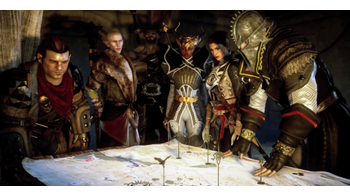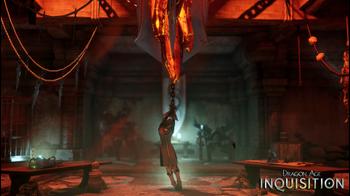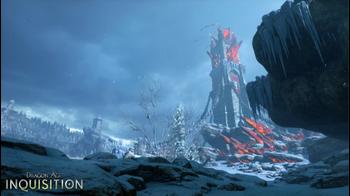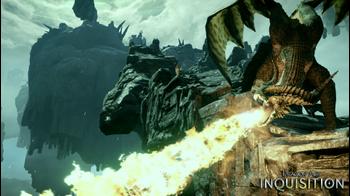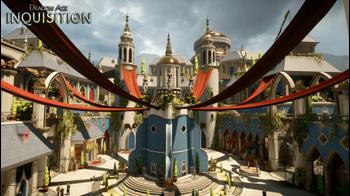
Discussing Inquisition and Beyond with Dragon Age's Creative Director
Mike Laidlaw has a damn cool job, but also a rather unenviable task. After working on a selection of Bioware's offerings prior to Dragon Age, he's since been placed into the role of creative director - not just for Inquisition, but for the whole franchise. That's a lot of pressure - especially after fans had a rather vocal response to the more mainstream friendly and arguably good-but-flawed Dragon Age II.
We caught up with Laidlaw as he and his team begin to ramp into final tweaks and launch plans for the upcoming Dragon Age: Inquisition, and quizzed him about the direction of this latest addition to the series, the longer-term future for the franchise, and even what he thinks of developments in the rest of the world of RPGs. Enjoy.
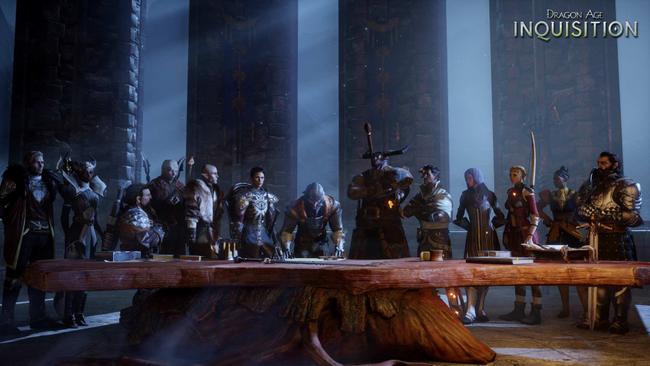
RPG Site: Dragon Age II had a mixed response. To my eye, it felt like it critically did a lot better than it fared with the fans - many critics with no particularly strong feelings about the first game found it a solid title, but fans of the original game were disappointed. How do you approach a sequel with a fanbase that, in theory, is split? What do you change?
Mike Laidlaw: Well... the wild card for the whole thing is really the move to Frostbite, right? So, we're on a whole new engine, we're changing tech. When that happens, you basically have to rebuild all of your systems from the ground up. Frostbite is an amazing engine for visuals, but it is definitely not an RPG engine out of the box by any means.
As such, we had an enormous engineering challenge in front of us. It was a challenge, but it was also a very good opportunity to sit back and look at everything. To say, "Okay, what do we consider to be the defining characteristics of the Dragon Age experience?" Obviously, feedback for Dragon Age II was incorporated into that. But that aside, I think that's more about understanding what makes Dragon Age unique, what makes it stand out, rather than what did or didn't work in the previous game.
For me personally, if I had to boil it down to a single concept, it's the party. It's not just you; you're not a solo adventurer - you are part of a team. Teamwork in gameplay is a part of that. The fact that we have a bunch of rich characters is a part of that. The fact that the follows are probably the most beloved part of Dragon Age is a part of that. It all really comes back to the party.
As such, when we sat down to look at it... we then need to examine how we make our unique features stand out even more. That realization led to some really key decisions. It's through that core understanding that we decided that, yes, although it's challenging, we were going to do a tactical camera, being able to control the whole party, the party hopefully players love, with a full overview at any time for the whole game. That really started the whole discussion because all of our ability designs needed to work both tactically and in real time.
I've seen people look at things like the rolling - the dodge, where the rogue rolls to the side. People would say, "That'll never work in tactical." Sure it can! You draw a line AOE to the right and press A to confirm... and when you unpause, he rolls that way! But you have to think it all through. You have to hold yourself to that.
Of course, beyond that, that meant a commitment to characters. We wanted to enrich interaction with characters, we wanted them to be interesting... all of those kind of discussions really drove it all home.
The other really huge opportunity is simply that Frostbite can do things Eclipse never could. The two biggies were big spaces - it's an engine built for jet fighters having dogfights over tanks! We can do a big, big level in Frostbite.
The second was the whole "levolution" concept, the idea of a level changing over time. In Battlefield DICE uses that for destruction, but I was like... what if we put a spin on that and make it construction? What if you and your party could have an influence that spread over these big levels, and you could see them change and evolve over time because of your influence and your decisions, the actions of the Inquisition.
It's that that those ideas started to percolate. It's like - okay, we've got big spaces, let's do not an open world, but a multi-region approach to the world. Let's let you go from desert, to swamp, to mountains... let's allow you to have an impact on the world.
It doesn't have to always be blowing up mountains, but sometimes let's have you establish a safe base camp, those kinds of things. Eclipse could never have done those things.
And then, of course, let's keep the party central, and make sure that the combat plays to that.
RPG Site: How much sharing goes on with Frostbite; to DICE, to the other Bioware teams...?
Laidlaw: Quite a lot, actually. We look at it as a sort of foundation platform. The DICE team has been very, very helpful, and... well, the Dragon Age team is responsible for a significant number of the check-ins that come back from external teams.
A large part of that is because what we're doing is so different to the stuff you see in Battlefield. We're building tech that does different stuff, but does cool stuff. Other teams end up seeing what we've been building and saying 'Ooh, that would be great' and then using it.
A classic example is we built a system by which we can set up a single scene, but characters can be varying heights. A dwarf is a very different height to a Qunari, for instance. With the system we built, that scene will operate; It might need a tiny bit of manual tweaking, but it'll out of the box, it works. That's a tough bit of tech, but we had a really good use case for it, we can test it, shake it down, check it into the mainline - and suddenly, hey - Frostbite's a better engine.
So, yeah - it's definitely a very collaborative effort, especially within the other Bioware teams. We're laying groundwork here for systems that our style of game uses, but those teams are going to continue to evolve Frostbite over time.
RPG Site: Given that you're set to launch almost a complete year after the new generation of consoles, I was surprised that you chose to go with a cross-generation release, hitting Xbox 360 and PS3 as well as Xbox One, PS4 and PC. What was the thinking behind that decision?
Laidlaw: I think the big thing is... y'know, we looked at when we were aiming to come out, and I think we're still in a transitional phase. We have a lot of fans on PC, we have a lot of fans on the 360 and PS3 as well.
We looked at it and basically decided, y'know, not everybody is going to have made the jump, and a lot of the people who won't have yet are going to want to play Inquisition.
We started to evaluate the opportunities of the tech to say - okay, how well does it scale? We quickly realized that a lot of the work we were doing was building content that actually... Well, you can't fit one of those massive levels into memory, right? Not on current-gen, not on last gen. It can't be done without some level of streaming, right? So we started building our system of streaming, and when we did, we wanted to make sure it could support the last-generation consoles too.
It's a challenge, for sure, but again, it's like the decision to have the tactical cam. Once we said we were going to be on those platforms, we started finding solutions!
RPG Site: Do you have any idea how many discs this'll ship on for the 360?
Laidlaw: I have no idea. There's probably some guy constantly watching the size of the game and sweating! 'Oh, god, it went up again!' [laughs] But, yeah - our programming group is always optimizing it, of course. As you develop you build up a lot of fluff, and you can pull a lot of that back out, and so on - so we'll lock that down a little closer to ship.
RPG Site: When I saw your presentation, you talked about branching content, and the idea of not allowing the average user to see every piece of content based on choices they've made. Often in games, developers deliberately choose not to do this in order to avoid spending development resources on content only a scant few would see. How much will be missed in favour of something completely different?
Laidlaw: Well, y'know, Miss implies that it's a negative, y'know? To me, it isn't. I think that's where a lot of people fall into the trap. Developers say 'We can't do it that way, users might miss it!' But, no, no... people like sharing their stories.
It comes down to a realization that we are now, more than ever, in a very social environment when it comes to gaming. A lot of people now don't just play a game, but they play a game and then talk about it, share with friends... it's become an ecosystem.
My goal with Inquisition is to have stuff that people don't find. I actually sent out a little demand: every single level must have at least one cave no one ever tells me to go in. No quests, no pointers, nothing. I don't care where you put it: I don't want to know where it is! Obviously, the team took that to heart and went even further.
Still, the idea of that as a mandate - that's me saying, it's okay! If a player doesn't find it, it's okay. They're going to go online - to your site, to a fan site, to Bioware Social - and they're going to do the, 'Hey, did you ever see the... No?! I found it yesterday' thing. You get comfortable with that idea, with that ecosystem, when you embrace it.
I don't want to, like, put a bullet point on it, but over all we want to make sure we have significant choices, and that they would branch out. We didn't want to just do it in the last ten minutes of the game, either - we wanted to do it mid game, even early game, so that there's plenty of time for echoes of your decision to keep coming back.
I really hope that players catch it - y'know, that we leave them going like, 'Oh, wow, I see how that diverged' - it's the kind of thing that helps to color your experience. That's kind of our approach to it!
RPG Site: So, how much does character race effect that kind of thing?
Laidlaw: It'll come up, for sure. A Human Inquisitor will certainly be a little more acceptable in certain social circles, for instance. There's certainly an awareness of your race throughout the game. While we're not doing a full-on Origin story - that was Origins' thing because we had a world to establish - we are doing our best to make sure that your race or your past does pop up whenever it's applicable.
You're always the Inquisitor first, but every once in a while somebody somewhere is going to take umbrage at something racial. 'An elf Inquisitor?! Brrr, what what what?!' All that kind of stuff, and that makes me smile.
RPG Site: Let's talk about fans, feedback - all of that stuff. Bioware has been quite big on it lately, but I also feel there's always a danger of listening too much. I've seen a lot of games, some from prestigious development houses, get focus grouped into the ground... so how do you find the balance?
Laidlaw: Balance, I think, is never quite something you achieve... it's something you maintain, right? I don't know if you've played enough of the Bushido Blades... [laughs] But it's something you never... you never quite stabilize. A big part of maintaining balance is, I think, recognizing that.
The way I tend to look at it is... you can never do everything that everybody wants, because most of the things in that pool contradict the other things in that pool. As such, my approach to it - and I think generally Bioware's approach - is to go back to first principles.
So... be willing to admit your mistakes. Stay humble. That's something Ray and Greg seared into our DNA - those are two of the humblest guys you will ever meet who are still, incredibly, somewhat surprised by their success. And yet... they're absolute geniuses.
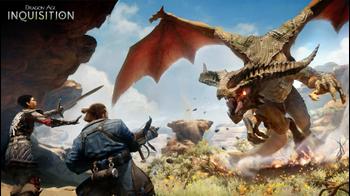
Anyway - you recognize when something may have gone wrong and adjust, but at the same time, if you know what you're trying to make and ask yourselves... Okay, what is Dragon Age about?
With that, we're back to my first points. It's about party, it's about this massive world - and what are the opportunities in front of us? Well, the engine does big spaces, so, cool! Let's explore that. In that sense, you have to be true to yourself.
A litmus test I try to use is just to ask - if I had to explain this to the fans, could I do so concisely and clearly and in a manner that would leave even those who don't agree saying that they get it? That's how you know you're not fooling yourself. Again - you can't ever please everybody... but you can give it a whirl.
RPG Site: Dragon Age as a series has always felt less connected than Mass Effect to me; each game stands on its own a lot more easily. With that noted, do you have at this stage any specific plans for the future?
Laidlaw: It's very much deliberately less connected than Mass Effect. I also absolutely have thoughts about where we're going next. We always keep that in mind.
The funny thing is that... if you have future plans, you can do stuff that helps everything feel coherent. So when I sit down with the novel writers, or the comic series, or I'm looking at Dawn of the Seeker and working with Funimation, the crew in Japan... If you have a sense of where you're going - it may be Northwest, it may be North East, but generally North - you can help lay groundwork.
The thing is, you don't have to be slavish to it. I knew at some point we'd explore Cassandra as a character. Dawn of the Seeker came along, and they said, hey, can we use a female protagonist... I said, of course! I've got a bad ass waiting in the wings, let's do this! That's how Dawn of the Seeker came to be.
Similarly, always approach every book, every comic book, all those things, as a chance to explore something we can't do in the games. We go to locations in the comics we haven't yet visited in the games - and, cool, that's a little early art exploration! On our side, we can look at how that looks and how people feel about it. They all matter. They're all things that can be better informed if we have future plans. At the same time, though, you have to be prepared to derail or defer the future plans.
Alongside that, we've known the events for Inquisition were coming, and were something we wanted to do because [David] Gaider and I have been very excited about them, as early as the end of Origins.
That's always basically been around the DNA, and the writers of course have been inserting little snippets and hints into codex entries and little histories of the Inquisition into DA2. And if you read them, or the lore book, you're like, "Oh! That's a lot of stuff about the Inquisition in there! It's like they planned it..." [laughs] Because, we did.
You build a world, and then you want to keep that world alive. The term in 'IP development' - which has gotten so sterile - is evergreen. It's a thing that can continue - it doesn't need a particular setting. Probably the hallmark, the template, now, is to look at the Star Wars universe. The Force is always there. There's always the Light and Dark sides, aliens, more planets... it could always keep expanding, keep going. I don't know if they consciously built it that way, but part of its enduring legacy is that it was built that way.
For us on Dragon Age, Thedas was conceived as a big world because one day we might go to the other places that we mention but don't show. That's really a legacy we're trying to continue as we go. Each new entry - games, or other media - each one solves some riddles and brings a few more up.
RPG Site: Given that you're an RPG fan yourself, working at an RPG at an RPG-specialist studio, how do you feel about where the genre is going? How do you feel about other genre titles, such as the Division, increasingly borrowing deeper RPG features? And what have you been playing?
Laidlaw: So... I've been a little busy! [laughs] I haven't been playing a ton. I've dabbled with Wildstar. I do like MMOs, and Wildstar is a game that knows what it is and celebrates it.
For me, the defining moment in Wildstar, which is kinda campy, is that they say, well, we're an MMO, we know what the concepts of this genre are... we're going to vacuum the loot in towards you when you press the V button. That sort of thing.
Anyway, when I hopped into a taxi and instead of the classic griffin or whatever it was a robot bitching at me about how, y'know, 'The Young AIs, they just get to be in charge of tanks!' and stuff... that was the best in-game taxi experience I've ever had, and it was just so refreshing and perfectly annoying in the same way real taxis are! I really love exploring stuff like that.
When you mention the RPG elements in the Division and games like that, I think... Well, the core of RPGs is that if you do things, you'll get better. Who the hell doesn't like getting better at doing things, right?
It's so true to life in the same way that Assassin's Creed. I think part of its success is that it takes you back to when you're seven, you're on the jungle gym, and you're king of the world because you've reached the top and your mother's freaking out 'cause you're not supposed to be up there. That's Assassin's Creed, right? Every time the Eagle takes off, you think, "Nobody should be up here," and then you jump off, which is even more crazy.
The idea of 'I've done some stuff - I've killed a lot of dudes, and now I'm more efficient at killing dudes' or what have you is the kind of thing that I think speaks to us. It helps take our leisure time and turns it into something else. In the same way that dreams sort of help us to get our brain in order, they keep people productive and focused, they set goals and allow you to achieve them; life skills are there to be learned in RPGs. So seeing it bleed into every game - racing games, shooting games - that's cool.
The RPG players, of course, have a toolset that instantly lets them recognize 'oh, I get what you're doing here, this is XP. Got it.' As game devs and RPG specialists, watching other genres gradually begin to use that stuff is cool and cute.
Where is the genre going to go? If anything, I guess my hope is that maybe we can all stop fighting about what a 'real' RPG is. For years it was the Japanese RPG versus the Western RPG and now it's a different debate.
So... The Witcher is more action focused, it has a sort of Batman-style real-time combat system; it's awesome! There's nothing wrong with that. That's really cool! Playing a dude with a sword who rolls and stabs and stuff? Yes, sold! Our game is about a party, and working them, and deploying people into positions, getting height advantage... that's a different style. I don't see any reason why one of those styles would be more RPG than the other, or any reason why they can't coexist in the genre.
Part of the fear I think, and you see this in a lot of genres that have had a lull - say space flight sim, lord help Star Citizen, I hope they get that right - is that it feels like there may only be one shot, so as a fan you have to hope that game speaks to you.
Meanwhile, RPG fans have been lucky. There's always been multiple choices. If you compare us to The Witcher or to whatever is being done with Final Fantasy now, those are three very different flavors of game - pick one! Pick them all! That's how I look at it. We can all learn from one another. Skyrim has certainly informed us, but we're taking a different tact on those ideas. The Witcher is just bad ass, and good on them. I love them for it.
Anyway, my point is that RPGs can be comfortable where they are. We as a genre can stand up confidently and say there is a reason why others are copying us. Let's just keep exploring this space and innovating.
Dragon Age: Inquisition is due to release this November for PC, PlayStation 4, Xbox One, PlayStation 3 and Xbox 360. It's available for pre-order now.
